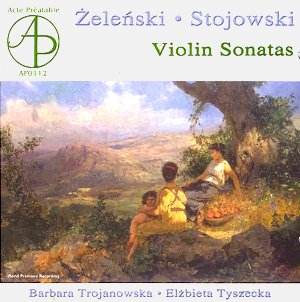Two otherwise unknown
violin sonatas by two Polish composers
separated by a generation but joined
by the relationship of master and pupil.
Trojanowski throws
herself into these works with considerable
abandon but at the expense of refinement.
There are roughnesses and abrasions
scattered about but with such a furiously
Franckian work as the Želenski
one can forgive all. Things let up a
little for the terpsichorean grace and
charm of the Allegretto only
to return to angst, tremors and black
clouds in the molto sostenuto finale.
His snatched ecstatic lyrical ideas
are a Fauré-like delight (try
III 3.09).
Stojowski has had some
attention from Hyperion. Both his piano
concertos have been recorded as has
an anthology of his piano solos. Like
the Zelenski this is a recording premiere
for his Violin Sonata. The first movement
is another high water mark example of
late-romantic plunging ardour. It has
a touch of salon sentimentality about
it too; something Želenski
steered well clear of. What the two
composers have in common is a folk accent
which is clearly to the fore in the
drone and slow dance of the Allegro
capriccioso. Amid the wood-smoke
there is also a hint of Mephistophelean
enchantment. The sentimentality comes
out again for the finale which veers
towards Bruch.
It
is interesting to compare master and
pupil as represented by these works.
Želenski would never drop his guard
and allow in sentimentality. Clearly
Stojowski had a more accommodating faculty.
However when you hear that soft-chiming
Brahmsian piano at 2:02 in the finale
of the Stojowski you know that it spells
a suave melody for the violin. And so
it arrives with the sob and the smile
of a spiritual. Then again Stojowski
steels himself for a stern determined
ascent at 6:12 in the finale. Sparks
fly to the four winds in the stamping
last three minutes of the Stojowski
sonata. Such is the savagery of this
music I several times thought of Bartók.
The radio studio-originated
recording is gamely - almost aggressively
- resonant. It’s also a shade boxy.
Acte
Préalable and these two artists handsomely
prove that Poland was not in the dark
ages between the death of Chopin and
the rise of Karłowicz and Szymanowski.
Rob Barnett
Full
Acte Préalable Catalogue


